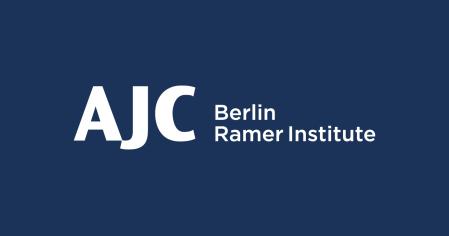Share on
This article first appeared in Tagesspiegel.
Munich 1970, Erlangen 1980, Frankfurt 1992 and Düsseldorf 2000: Four different cities in the Federal Republic of Germany, four different decades. Yet, these four places are tragically connected. And although they are fatally linked, these four dates receive little attention.
On February 13, 1970, Holocaust survivors Rivka Regina Becher, Meir Max Blum, Rosa Drucker, Arie Leib Leopold Gimpel, David Jakubovicz, Siegfried Offenbacher and Eliakim Georg Pfau were murdered in an arson attack on a Jewish retirement home in Munich. On December 19, 1980, Rabbi Shlomo Lewin and his partner Frida Poeschke were shot dead by a neo-Nazi in front of their house in Erlangen. On February 23, 1992, Holocaust survivor Blanka Zmigrod was murdered by a Swedish right-wing terrorist, shot in the head on the street in Frankfurt am Main. And in an bombing on July 27, 2000, at the Düsseldorf-Wehrhahn train station, dozens of people were critically injured; one pregnant woman lost her unborn child as a result.
To this day, these names and attacks have received little recognition in public remembrance or in the discussion about antisemitic violence after 1945. They are largely unknown. As varied as these acts are, they have salient traits in common: In all cases, antisemitism either cannot be ruled out as a motive, or it is the only possible motive. Similarly, none of the cases received a judicial investigation into antisemitic motives, or, in some cases, the perpetrators were never identified. On today's 30th anniversary of the murder of Blanka Zmigrod, it is therefore not only important to remember her fate, but also the bloody continuity of antisemitic violence in the Federal Republic of Germany.
Blanka Zmigrod, then 68 years old, was attacked and murdered in Frankfurt am Main on February 23, 1992. The murderer fled with her handbag on a bicycle. The Swedish right-wing terrorist had already shot at eleven people for racist reasons in his home country between 1991 and 1992, including the murder of student Jimmy Ranjba. His deeds are considered to be a model for the murders by the so-called NSU, and the right-wing terrorist of Oslo and Utøya also referred to him in court as a model.
Before the crime, the perpetrator had insulted Blanka Zmigrod with racial slurs while she was working as a checkroom attendant at the Mövenpick Restaurant. The tattoo from her time in a concentration camp may have revealed her Jewish identity. However, neither of these circumstances was taken into account in the grounds for the court sentence. When the perpetrator was finally sentenced to life imprisonment in Frankfurt in 2018, the regional court saw only greed as a motive. A political evaluation of the crime has not taken place until today.
The cases mentioned reveal just a fraction of the continuity of antisemitic violence over the past decades. Credit is due to journalist and author Ronen Steinke, who in his book "Terror Against Jews," published in 2020, made an unprecedented effort to chronicle these acts of violence.
Steinke’s book and his meticulous research are deeply important. However, it should be the responsibility of antisemitism researchers here to carry out this work. Regrettably, that has not happened thus far, or not to an adequate degree. For example, there is still no official record of the desecration of Jewish cemeteries. The matter goes beyond the documentation of these acts. These are, after all, crimes that point to a core element of antisemitism: Even the dead are persecuted beyond the grave and are not allowed to rest in peace. One of the reasons for the widespread lack of attention to antisemitic violence is that research on antisemitism in this country is still primarily conducted within the context of the study of history.
Similarly, German society on the whole lacks an understanding of the prevalence and continuity of antisemitic attitudes. For decades, empirical social research has concluded that around 20 to 25 percent of the population agree more or less clearly with antisemitic statements. At the same time, especially since the onset of the pandemic, we have witnessed a constant shift in the limits of what is considered acceptable speech, and hatred of Jews is being expressed more and more openly. Complementary to this, according to the Federal Ministry of the Interior, 3028 antisemitic crimes were counted in 2021 - a new high.
So, if we want to talk about and seriously confront antisemitism in this country, we must first acknowledge that it was never gone, and that it remains an integral part of our post-Nazi society to this day. And we must finally talk seriously about the fact that antisemitic violence, like racist violence, is thriving in a social climate where perpetrators not only feel safe and speculate on at least the silent approval of a significant portion of the population, but also see themselves as enforcers of these attitudes.
Therefore, it is important to finally respond to antisemitic demonstrations and manifestations with appropriate rigorous application of the rule of law. This applies to so-called Corona protests or to antisemitic demonstrations against Israel such as those seen in May last year. The legal prosecution of antisemitism can only be one means, since antisemitic thinking is not, in itself, a punishable offense. What is needed here is a strong civil society that names and condemns antisemitism regardless of its direction.
In view of this attitude towards antisemitic violence since the end of the Second World War, it is hardly surprising that Jewish communities in this country have little trust in the law enforcement agencies and legal system. A fundamental cultural change must finally take place here. Victims of antisemitic crimes must be treated as credible when they name perpetrators’ motives - from the moment a complaint is filed until the trial. And this must also be evident in the grounds for the verdict.
It is simply unacceptable that in the Germany of 2022, Jews should even have to doubt whether to go the police. To further strengthen trust in law enforcement agencies, it is equally urgent that those agencies take action against right-wing extremists and neo-Nazis within their ranks.
Especially after the discoveries of right-wing extremist networks in recent years, it is no longer acceptable to respond with the claim that these are merely "isolated cases”, even if the vast majority of police officers are, of course, beyond reproach. This crackdown is also so urgently needed because Jewish communities and institutions in this country rely on police protection. There are lives depending upon it.
Dr. Remko Leemhuis is the Director and Ruben Gerczikow is Associate Policy at American Jewish Committee Berlin.



